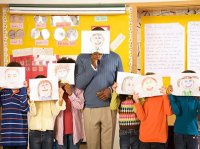

Self-reflection is self-assessment, and one of the most significant learning tools we can model for our students. Ultimately, we want our children and adolescents to be the self-assessors of their work, dispositions, and goals. Research repeatedly reports that the difference between good teachers and superior teachers is that superior teachers self-reflect.
The brain is wired for this strategy, and it has been a part of our evolution. When we teach to a child's or adolescent's brain, we empower that student with the "inner resources" that directly affect his or her ability to pay attention, engage, and create meaningful learning experiences. School culture is simply about relationships, and the brain is a relational organ designed to survive, think, and feel. People change people; programs do not create sustainable meaningful changes. Through the integration of resiliency research coupled with a deep understanding of how our neuroanatomy affects the stress response system, and our attention and ability to remember, we no longer need to manage behavior. Instead, we begin to engage one another.
Simply stated, when the brain feels any type of a threat (emotional, social, or cognitive stress) the thinking part shuts down. Unless a school culture feels or is perceived as "safe," learning does not occur. We are unable to process, integrate, and remember topics, concepts, and standards. Educational neuroscience is about creating states of mind for learning that initiate curiosity, anticipation, autonomy, self-reflection, and awareness.
The following self-assessment survey, created for students and educators, provides questions that address short- and long-term goals. In doing so, it provides a framework for metacognition (thinking about our thoughts) and helps us each to clarify, reflect on, and prioritize our feelings, actions, and behaviors. It allows us to begin feeling a sense of autonomy throughout our learning processes.